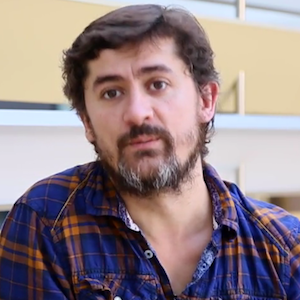This article is available also in Deutsch, Español, Français and العربية
 In this regular feature we hope to shine a light on the work of our partners and other leading initiatives around the world in the fight against misinformation. Samuel Laurent, deputy editor of Le Monde and head of Les Décodeurs, the newspaper’s fact-checking and hoax-busting project joins us to discuss his work.
In this regular feature we hope to shine a light on the work of our partners and other leading initiatives around the world in the fight against misinformation. Samuel Laurent, deputy editor of Le Monde and head of Les Décodeurs, the newspaper’s fact-checking and hoax-busting project joins us to discuss his work.
Samuel joined Le Monde in 2010 and turned Les Décodeurs from a small explainer blog on the newspaper website into a home for fact-checking and data journalism after the 2012 French Presidential election.
Since then the Décodeurs team has expanded to 12 and is set to launch the multi-faceted Decodex in early February, using a database of more than 600 websites to make users better informed about the websites they visit, said Laurent.
The Decodex project also includes a browser extension for verifying websites and a Facebook Messenger bot to provide tutorials on debunking stories and checking if a website is a reliable source.
Samuel gave First Draft some insight into how he approaches the issues of misinformation and fact-checking in his work.
What is the first thing you do at the start of your work day?
The first thing I do in the morning is to check Twitter for the last news, then my emails and Slack. My team chats on Slack before I arrive at work to identify and discuss the stories we will run during the day.
What is the best advice you’ve ever been given for this kind of work?
“Love your haters, because they are your biggest fans,” a quote by the great philosopher Kanye West.
What are your top three tools for work?
I use Tweetdeck a lot to find hoaxes and claims to fact check, and Google reverse image search to debunk images. And then there’s our homemade set of data visualization tools called grumpycharts; one of our data journalists developed it and he is quite grumpy. It’s an internal term and we just kept the name. Maybe if we go public one day we will change the name. Maybe not.
What was the most challenging story you’ve ever worked on and why?
Probably the Panama Papers investigation, but that’s not fact-checking or hoax-busting. Concerning those projects, I think it was the fake claims of torture around the Bataclan attacks, mainly because after we debunked it, I had a big tweetclash with a journalist from an alt-right publication, who published and spread this fake story.
There were rumours about torture at the Bataclan but there has never been any evidence for this, just rumours. Police investigators and forensic doctors both said there was no evidence for this in official hearings last year. Of course, [the journalist] didn’t change her mind or her story.
What story or project are you most proud of working on and why?
I’m quite proud of the Decodex, a tool we are releasing to help our readers detect fake news sites, and of the work we are doing with French researchers to automate fact-checking and hoax-busting. That project is called Content Check, and we started it around two years ago. We have about half-a-dozen French research units working with us, mainly in information science and computer science, and the aim of the tool is to give the reader or viewer more context around issues.
So imagine there’s a politician talking about unemployment. This tool will be able to check what the politician is saying and understand what he is talking about, then go find a database, find the most recent figures about unemployment and bring them back to the reader to give them context, live, in real-time. That’s the ultimate goal of the project.
We already have a tool that can find sources in text, which will be part of the Decodex. We’re working with people who specialize in natural language processing and with another research unit which specializes in databases. They are developing a database that Content Check will grab stats from live. Hopefully that will be released at the end of the year.
What are the most important skills for working in this area today?
Obviously some the nerves to resist online harassment, but mostly skepticism, determination and a bit of knowledge about statistics can help, too. For fact-checking or data journalism you sometimes need to be able to calculate averages or variances or some mathematical figures, or understand correlations so you don’t make a false assumption. So statistics knowledge can help, but we also use some very simple statistics so it is not difficult. But mainly you have to be rigorous and serious when dealing with figures and numbers.
What one tip do you think we should all be teaching our friends and families to make them more critical consumers of news?
Never trust a picture or video straight away, always cross-check something with other sources before sharing it. Always try to think first and not be fooled by your emotions, and don’t fall for conspiracy theories.
If you had $5 million dollars what would you do tomorrow which you think would help solve these problems?
I would probably launch something to educate young people about how to read news. One of the main problems of this fake news era is the fact that young people are most often on the internet, and most informed by the internet, but they don’t really know how it works.
Every time I talk with pupils or students some of them are confused about sources. Even journalism students. When I give lectures some come and say “I found this” and I look at the website and say “WTF? This is bullshit.” But they don’t see it. And sometimes you have people doing the reverse and saying “that’s an official statement but what tells me it’s true?” It’s right to question things but if you don’t trust anyone it gets really complicated.
You can have a huge story with a big investigation working for months, and people see it but then quote some blog from a guy who just sat and wrote something in 20 minutes, saying he doesn’t like it or believe it. People compare them evenly, the big professional investigation and an op-ed from a right-wing guy saying we shouldn’t believe it.
Another problem is this modern idea of the journalist as a corrupt individual and I think that’s a problem of media transparency. People don’t know how we work and sometimes it can be useful to know how journalism works and as a way of checking truth. So I think there are huge issues and potential improvements to the way we teach young people how to use the internet, about what makes a good source, about how journalism works.
Are there any initiatives or organizations doing great work anywhere in the world that you wish more people knew about?
Some citizen fact-checking projects in other countries are really worth looking at. Like StopFake in Ukraine, a country already swarmed by fake news. These fact-checkers are often doing it for free and risking their lives to do it, so they deserve to be known.
Peace of mind is important, so how do you disconnect from work at the end of a shift?
I made a New Year’s resolution to not respond to trolls anymore, and I have been quite successful so far. It’s surprisingly effective for health and peace of mind.
I mainly try to shut down my phone and computer for at least two hours in the evening to talk and play with my daughter, and to spend time on weekends doing things that are totally offline, like gardening or cooking.



